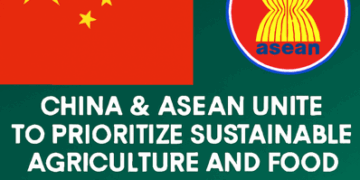In a landmark move toward regional sustainability, China and ASEAN Unite (ASEAN) have deepened their commitment to agricultural cooperation and food security. The 26th ASEAN-China Summit held in Jakarta marked a pivotal moment, with leaders endorsing a joint action plan focused on green agriculture, climate resilience, and digital farming ecosystems. This strategic alignment aims to address pressing challenges such as climate change, supply chain disruptions, and food scarcity across East and Southeast Asia.
🤝 Strategic Partnership Highlights
- Launch of the ASEAN-China Green Agriculture Initiative
- Joint investment in climate-resilient crop research
- Expansion of cross-border agri-tech startups
- Digital ecosystem integration for smart farming
📊 Key Focus Areas of Cooperation
| Sector | China’s Role | ASEAN’s Role | Joint Goals |
|---|---|---|---|
| Green Agriculture | Tech transfer, funding | Policy alignment, pilot farms | Reduce carbon footprint |
| Food Security | Export surplus grains | Improve local distribution | Stabilize regional supply |
| Digital Farming | AI, IoT integration | Farmer training | Boost productivity |
| Climate Resilience | Satellite data sharing | Disaster preparedness | Protect crop cycles |
🌐 Global Implications
This partnership signals a shift toward multipolar cooperation in agriculture. With the Gulf Cooperation Council (GCC) also expressing interest in trilateral collaboration, the ASEAN-China alliance could become a blueprint for sustainable development across emerging economies. The initiative aligns with UN SDG goals and sets a precedent for regional self-reliance in food systems.
📈 Economic Impact
According to trade analysts, the ASEAN-China agricultural corridor could unlock over $50 billion in bilateral trade by 2030. Key exports include rice, palm oil, soybeans, and agri-tech hardware. China’s Belt and Road Initiative (BRI) infrastructure is expected to support logistics and cold chain expansion across ASEAN member states.
🧪 Innovation in Agri-Tech
China’s agri-tech giants like DJI and Pinduoduo are collaborating with ASEAN startups to deploy drones, smart irrigation systems, and blockchain-based crop tracking. These technologies aim to reduce post-harvest losses and improve transparency in food supply chains. ASEAN nations like Vietnam and Indonesia are already piloting smart rice farms with AI-powered yield prediction.
📣 Policy Announcements
- ASEAN-China Joint Statement on Agricultural Cooperation (2025–2030)
- Launch of the ASEAN-China Digital Farming Fund
- Creation of a Regional Food Security Dashboard
🌍 Regional Resilience Through Collaboration
As global food systems face mounting pressure from climate volatility and geopolitical tensions, the ASEAN-China alliance offers a stabilizing force. By pooling resources, sharing technology, and aligning policy frameworks, these nations are building a resilient agricultural backbone for the region. This collaboration not only secures food for millions but also empowers smallholder farmers through inclusive innovation. With digital platforms, satellite data, and AI-driven insights, even remote communities can participate in the future of farming. The success of this initiative could inspire similar models in South Asia, Africa, and Latin America, creating a ripple effect of sustainable development worldwide.
🧭 Challenges Ahead
Despite the optimism, experts caution that implementation will require overcoming bureaucratic hurdles, data privacy concerns, and uneven digital infrastructure. Smallholder farmers in remote areas may struggle to adopt new technologies without adequate training and subsidies.
🌱 Sustainability Goals
The partnership emphasizes regenerative farming, organic certification, and carbon-neutral supply chains. China has pledged to reduce fertilizer use by 30% in its ASEAN exports, while ASEAN nations aim to convert 20% of farmland to sustainable practices by 2027.
📍 Country-Specific Highlights
- Indonesia: Smart palm oil plantations with satellite monitoring
- Vietnam: AI-based rice yield forecasting
- Philippines: Blockchain for seafood traceability
- Thailand: Organic fruit export expansion
🧠 Expert Opinion
Dr. Chen Wei, a leading agri-policy advisor, stated: “This is not just a trade agreement—it’s a vision for a resilient, tech-driven agricultural future. ASEAN and China are setting the tone for global cooperation in food security.”
📌 Final Thoughts
The ASEAN-China agricultural alliance is more than a diplomatic gesture—it’s a strategic pivot toward sustainable development, innovation, and regional stability. As climate threats grow and food systems face pressure, this partnership offers a hopeful blueprint for the future.
📤 Share This Article
If you found this article insightful, share it with your network. Stay tuned to TradeAgroTechNews for more updates on global agriculture, trade, and technology.

















